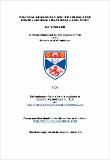Political imagination and the struggle for power : Algerian Islamism as a case study
Abstract
This dissertation is
concerned with the case study of
Algerian
political
Islam in the contemporary era.
The
central research
question addressed
here is two fold. First, the question of whether
political
Islam
constitutes a radical
ideological break
with the
Algerian
political
ljfeworld is
asked.
The
political
imagination
of
Algerian Islamism is
analysed
in its historical
and political contexts
to unearth areas of rupture with
dominant forms
of political
imagination, but
areas of
hybridity
and of complicity with such
formations
are also
highlighted. Thus, the main contention of this
thesis is that the discursive
relationship
between Islamist
political
formation
and that of their opponents
in the political sphere
is
complex:
Islamist political
imagination is
oppositional to the state,
but it does
not escape the discursive tools for legitimation
present
in
the existing
ljfeworld. Secondly, the consequences of this argument
for
our understanding of the Algerian Civil War
of the 199os are
addressed.
It is
argued
here that political
imagination is
one of the
key loci
where political contest
has been
played out
in the
contemporary
Algerian
setting.
The
confrontation
between the
regime and political Islam is the most up to date
example of a
struggle
for
power that necessitates the monopoly over the
legitimising tools of
history
and culture.
More importantly, this
framework
questions the notion that the state-Islamist confrontation
in
subsequent years can
be
explained
in
a
binary fashion (Good
vs.
Evil; Rational
politics vs. Irrational theocracy). In fact, this
confrontation over political power
is
consistent with existing
patterns of political competition
in
postcolonial
Algeria.
Type
Thesis, PhD Doctor of Philosophy
Collections
Items in the St Andrews Research Repository are protected by copyright, with all rights reserved, unless otherwise indicated.

